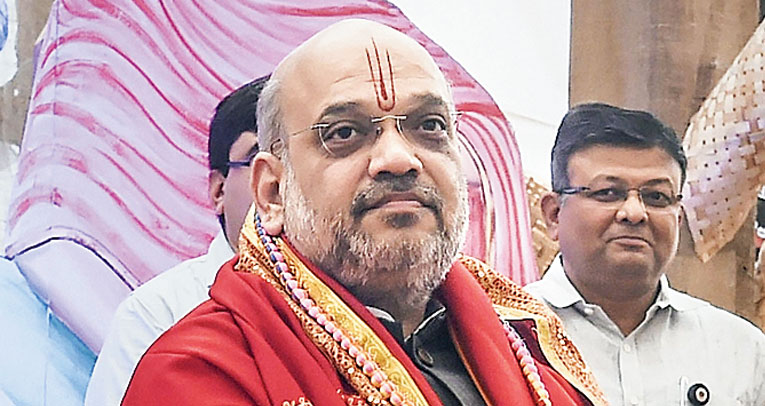Union home minister Amit Shah on Wednesday said all canteens that cater to the central armed police forces (CAPF) would sell only “swadeshi” (indigenous) products from June, the announcement coming a day after Prime Minister Narendra Modi’s “vocal for local” call.
Shah’s announcement led to confusion among CAPF officials in the absence of any clarity on what constituted swadeshi and whether these products would also include foreign brands that have manufacturing units in the country.
It also led to resentment among veterans of paramilitary forces who accused the central government of promoting products of yoga televangelist Ramdev’s company Patanjali.
“Baba Ramdev is very close to the political leadership and had also campaigned for Modiji during the Lok Sabha polls. It seems the Centre is now paying back the favour to the yoga guru by allowing only swadeshi products,” Ranbir Singh, national coordinator of the Confederation of Ex-Paramilitary Forces Welfare Associations, told The Telegraph.
Over 1,700 Central Police Canteens (CPC) across the country cater to the families of the 10-lakh-strong seven central armed police forces — the BSF, CISF, ITBP, SSB, CRPF, Assam Rifles and the NSG.
“This is going to benefit Baba Ramdev who has a multi-crore swadeshi consumer goods empire and has long been campaigning for natural products claiming MNCs sell chemical stuff,” Singh said.
Ramdev runs the Patanjali enterprise with his friend Acharya Balkrishna from a sprawling campus on the outskirts of the Uttarakhand pilgrim town Haridwar.
Patanjali spokesperson S.K. Tijarawala dismissed Singh’s allegation. “Baba Ramdev and his Patanjali have been propagating swadeshi products for several years now. We are sure that this is the only way India can become self-reliant. This is a baseless allegation,”he said.
Shah’s announcement, according to a home ministry statement, said all the CPC canteens would sell only “swadeshi” items from June 1, a move that would lead to around 50 lakh families using indigenous products.
The statement said the total yearly purchase value would be around Rs 2,800 crore. “With this decision, 50 lakh family members of about 10 lakh CAPF personnel will use indigenous products,” it said.
Families of retired CAPF personnel too can use these canteens — a system the Union home ministry had initiated in 2007 — as also families of state police personnel.
According to Shah, the statement said, if every Indian takes a pledge to use products made in India, the country could become self-sufficient in the next five years.
In his address to the nation on Tuesday night, Modi had pitched for using local products. “Therefore, from today every Indian has to become vocal for their local, not only to buy local products, but also to promote them proudly,”Modi had said, according to a translation uploaded on the Prime Minister’s website.
Modi had not used the word swadeshi, but Shah did, according to the home ministry’s statement.
A home ministry official said there was “still no clarity” on what constituted swadeshi and videshi (foreign). “Senior officials in the ministry have been asked to draw up a list of products which will be allowed to be sold in the CPC canteens.”
The CPC canteens stock a wide spectrum of product groups – of almost all the big brands available in India – that include cosmetics, toiletries, electrical and electronic appliances, kitchen appliances, packaged foods, grocery items, uniform sets and accoutrements, lifestyle products, footwear, hosiery items and textile goods, helmets and even automobiles.
An official said the Central Purchase Committee negotiates with the firms to get maximum discounts along with consumer promotional offers on products. “The CPC beneficiaries get a vast and varied range of choice of quality products on lower prices than the market,” he said, adding that 421 firms, including multinational companies, were registered with the CPC.
Ranbir Singh said the government had turned down their demand for GST exemption for these stores despite several communications to the finance minister and the home minister. “We have long been demanding GST exemption on a par with the armed (defence) forces so that the personnel working in very hard-duty areas and inhospitable terrain like borders and Naxalite-affected areas can procure household items at nominal rates, but the ministries rejected it,” the former CAPF official said.
The defence canteens that cater to army, navy and air force personnel are exempt from paying the goods and services tax.
“Today’s decision is nothing but a political gimmick,” Singh said.
Sources in the army said so far no decision had been taken to stock only local products in army canteens.










